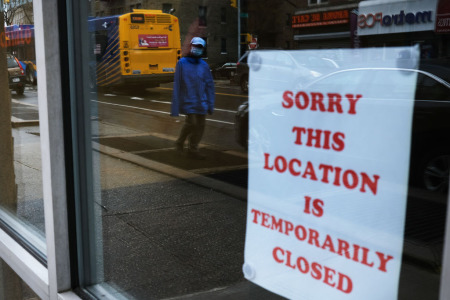Christian leaders demand access to COVID-19 relief loans for business owners with criminal record

Evangelical and Catholic leaders are calling on federal lawmakers to make legislative changes to allow coronavirus relief loans to be given to business owners who have criminal records as Congress works to pass a second relief bill this week.
On Monday, the leaders of nine evangelical and Catholic organizations signed on to a letter sent to Sen. Marco Rubio, R-Fla., chair of the Senate Committee on Small Business and Entrepreneurship.
The letter called on him and other lawmakers working to pass a second relief package to correct a Small Business Administration interim rule that disqualifies people with certain criminal records from accessing the emergency, low-interest, and in some cases forgivable loans made available by the CARES Act.
“Each year, more than 600,000 state and federal prisoners are released and face significant barriers to successful reentry — including occupational licensing and meaningful employment,” the letter states. “Small businesses provide a vital opportunity for those with a criminal record to contribute to society, to earn an honest profit, and to give back to others.”
Under the interim SBA rule, business owners with certain criminal records or those who are subject to judicial proceedings are denied access to the $350 billion Paycheck Protection Program created to help businesses and organizations pay their employees and other costs as states shut down the economy.
As businesses across the country have been forced to shutter or lay off employees in response to state lockdowns to combat the coronavirus pandemic, faith leaders have warned that denying loans to business owners because of their criminal history not only hurts them but also hurts their employees.
CBS News reports that some business owners with criminal records have already been denied PPP loans.
Lawmakers are working on another relief package that would reportedly add over $310 billion more in additional PPP loans for businesses. The measure has already passed in the Senate and the House of Representatives is also expected to pass the legislation. It's unclear whether the new bill will fix the interim rule.
Among leaders who signed the letter are: Russell Moore, head of the Southern Baptist Convention’s Ethics & Religious Liberty Commission; National Association of Evangelicals President Walter Kim; Anthony Granado of Catholic Charities USA; Gabriel Salguero of the National Latino Evangelical Coalition; and Heather Rice-Minus, the director of government affairs for Prison Fellowship, the nation’s largest evangelical prison ministry.
Other organizations represented in the letter include the Catholic Mobilizing Network, Catholic Prison Ministries, the Center for Public Justice, and the Jesuit Conference of the United States.
Specifically, the interim final rule states that businesses can be excluded from the program if 20% or more of the equity of the applicant is incarcerated, on probation, on parole, subject to an indictment or arraignment or “other means by which formal criminal charges are brought in any jurisdiction.”
Additionally, the rule excludes companies with owners who have been convicted of a felony within the last five years.
The faith leaders argue that the SBA’s policies “go against the intent of the [CARES Act] legislation” and go against the bipartisan desire shared by the Trump administration to support second chances for former prisoners who have paid their debts to society.
The faith leaders warned that it would be “counterproductive” to exclude people with criminal records. They also criticized the rule for excluding “individuals who have never been duly convicted of a crime.”
The faith groups are calling for the PPP exclusion to be replaced with “narrowly tailored guidelines that exclude only those with recent fraud convictions.”
The faith leaders contend that the rule would “judiciously use federal dollars without prohibiting access to funds by valuable small businesses.”
“An estimated one in three Americans has a criminal record,” the letter reads. “Because so many employment barriers exist for people with a criminal record, many start their own business to support themselves and their families. The exclusions listed in the aforementioned rule are far too broad and endanger the economic welfare of people with a criminal record — and the Americans they employ.”
Prison Fellowship’s Rice-Minus joined leaders of eight other justice organizations in sending a separate letter to congressional leaders and heads of the U.S. Treasury and Small Business Administration to voice their concerns with the interim rule.
Such a policy, they say, fails to recognize “successful rehabilitation.”
The organizations argue that “such a restriction was not included in the statute authorizing the PPP and it need not be part of the Interim Final Rule.”
The letter was sent by a coalition of organizations headed by Americans for Prosperity and Right on Crime, an organization that supports conservative solutions for reducing crime, restoring victims, reforming offenders, and lowering taxpayer costs.
Several conservative leaders signed onto the letter, including Tim Head from the evangelical conservative grassroots organization Faith & Freedom Coalition, Grover Norquist of Americans for Tax Reform, and David Safavian of the American Conservative Union.
The leaders are calling on the Trump administration to tailor the final interim rule to “reflect common-sense.”
They contend that unless the criminal record at issue is related to the fraud of federal programs or past SBA violations, past criminal charges should not be “relevant to qualifying for assistance under the PPP.”
“Abandonment of these small businesses — and their employees — in a time of national economic crisis is not an acceptable outcome for our entrepreneurs, their workers, or the economy as a whole,” the letter asserts.
“Justice-involved people who have overcome the odds and successfully started businesses should be recognized as successes,” the letter adds. “But at a minimum, they should not continue to be penalized for having a criminal history, particularly when that history bears no relation to their business operations. In short, they should not be excluded from the PPP.”
Follow Samuel Smith on Twitter: @IamSamSmith
or Facebook: SamuelSmithCP





















